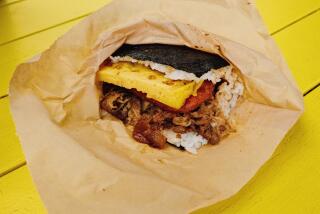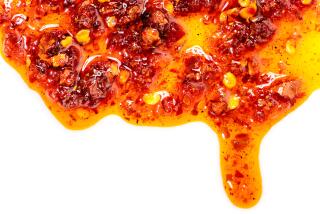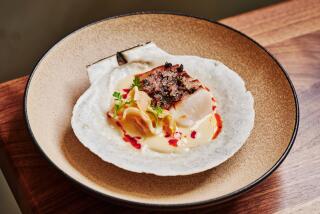Hawaii Is on the Menu of a New Canned Mystery Meat
- Share via
HONOLULU — Not since the overthrow of Hawaii’s last queen has a foreigner dared to wage a battle so fierce against an island institution.
Spam has been Hawaii’s undisputed king of canned luncheon meat since the curious, gelatinous, pink, pork brick was introduced to the islands during World War II. But a Danish copycat called Tulip is trying to unseat Spam from its throne.
In Hawaii, Spam is more than a four-letter word for unwanted e-mail. The product, made by Austin, Minn.-based Hormel Foods Corp., isn’t just another canned meat. It’s a staple food and part of island culture. Hawaii leads the nation in per capita Spam consumption.
After two years of planning and development, Tulip was introduced in Hawaii in August with an aggressive marketing campaign and an ambitious goal of gaining 20% of Spam’s enviable market share in two years.
Tulip’s distributor and marketer, Advantage Webco Dodge Hawaii, said sales have been strong. Its marketing goal of selling 1.2 million cans may be met a year earlier than expected, the company said.
“Surprised? Oh yeah, because you just can’t just challenge the big boy and expect to do that well in the first year,” said Percy Higashi, Webco’s vice president.
But Higashi acknowledged that putting a major dent in Spam would be a challenge.
“I don’t think anyone has been successful against Hormel in Hawaii,” he said.
Hawaii residents consume nearly 7 million cans of Spam a year, an average of about six cans for every man, woman and child. McDonald’s in Hawaii serves Spam for breakfast. Spam musubi -- a slice of Spam atop a slab of rice all wrapped in seaweed -- is an island favorite that’s sold at nearly every convenience store, including 7-Eleven.
In fact, it’s hard to find a cupboard in Hawaii that doesn’t have a couple cans of Spam. It’s one of three necessities -- the others being toilet paper and rice -- that people stock up on whenever there’s a threat of a hurricane or dockworkers’ strike.
“It’s everywhere in Hawaii,” said Nick Meyer, senior brand manager for Spam.
Some consumers said they’re willing to try Tulip, but they’d have a hard time giving up Spam.
“I would buy Tulip, but we’re so used to buying Spam,” said Richard Shimabukuro, who said Tulip tasted similar to Spam but was less salty. “We’ve been eating it all our lives.”
Meyer said Spam, which holds about 95% of the Hawaii market, welcomes Tulip.
“Competition is good,” he said. “We realize they might take some of our share away, but our hope is that consumers will see that Spam is the tastiest product out there and ... come back.”
Tulip isn’t available outside Hawaii; it was created specifically for the Hawaii consumer. The product by Tulip Food Co. is made partly from bacon and features a musubi on its packaging.
“The introduction of bacon is what really set this product apart for us because local people like bacon,” Higashi said. “I don’t know if it’s flattery, but we just noticed Hormel has just introduced a Spam with bacon.”
Hormel, which makes Black Label Bacon, introduced a Spam with bacon this month. It will be sold in Hawaii before it is introduced in other markets, Meyer said.
But Higashi said it isn’t just coincidence that Hormel’s Spammobile recently visited Hawaii for the first time. The biggest shock for Higashi was when Spam came out with its own Hawaii collector’s can featuring a picture of a musubi in August, the same month that Tulip came out after two years of focus groups.
“When we saw the other can pop up, we knew they wanted Tulip to go away,” Higashi said. “I think we’re flattered because things that never happened in the Hawaii marketplace [are] starting to happen.”
Meyer said the Spammobile’s visit, the new bacon product and the Spam Hawaii can have been in the works for a long time -- and are not in response to Tulip.
At Times Supermarkets’ 12 locations, purchasing director Ed Vargas said Tulip sales are better than he expected.
“I think Tulip has done a good job in trying to take market share,” he said.
Besides Tulip, there are also about half a dozen other luncheon meats on the market, including Treet, Celebrity and some generic brands.
Spam doesn’t seem worried about Tulip.
“It’s not to say they’ll never have a big share in the market, but right now, my bigger competitors are Portuguese sausage, deli meats and bacon,” Meyer said. “Frankly, it’s not Tulip.”
More to Read
Eat your way across L.A.
Get our weekly Tasting Notes newsletter for reviews, news and more.
You may occasionally receive promotional content from the Los Angeles Times.










